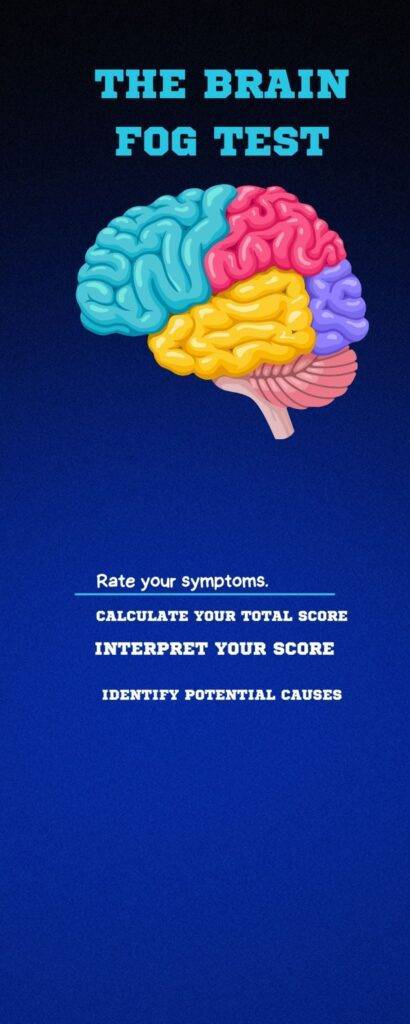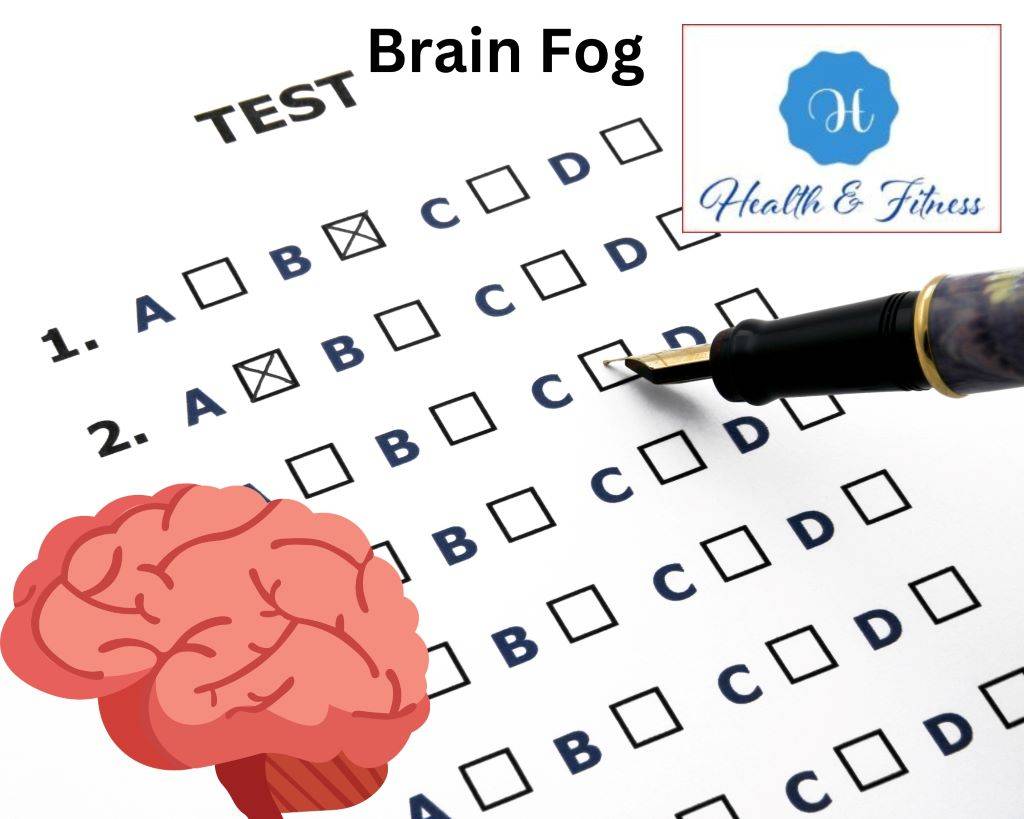Brain Fog Test: Unveil the mystery behind your mental haze with the brain fog test. Discover clarity and solutions for a sharper mind.
Introduction
Have you ever found yourself struggling to concentrate, feeling mentally sluggish, or unable to think clearly? If so, you might be experiencing brain fog. Brain fog is a common phenomenon that can leave you feeling like you’re walking through a thick haze, making it difficult to focus and perform at your best. But fear not! In this blog post, we’ll explore the mystery behind brain fog and provide a simple test to help you identify and overcome this mental obstacle.
What exactly is this brain fog?

Brain fog is a term for a brief state of cognitive failure with signs like inability to focus, forgetting things, and having trouble understanding information. While brain fog is not officially recognized as a medical condition, it can still serve as a valuable indicator of underlying issues that warrant attention.
Causes of Brain Fog
Several things may cause brain fog, including:
- Sleep deprivation: A lack of quality sleep can leave you feeling groggy and unfocused. Aim for 7-9 hours of sleep per night to ensure your brain has time to recharge.
- Stress: Chronic stress can wreak havoc on your mental clarity, as it causes your body to produce cortisol, a hormone that can impair cognitive function.
- Diet: Consuming a diet high in processed foods, sugar, and unhealthy fats can lead to inflammation, negatively affecting brain function.
- Dehydration: Even mild dehydration can have a notable impact on cognitive performance. As a result, it is imperative to prioritize staying hydrated by drinking an adequate amount of water throughout the day.
- Hormonal imbalances: Fluctuations in hormone levels, notably during menopause or because of thyroid issues, can significantly contribute to brain fog.
- Medications: Certain medications, including some antidepressants and anti-anxiety drugs, can cause cognitive side effects.
- Nutrient deficiencies: Moreover, inadequate intake of vital nutrients, such as vitamin B12, iron, or omega-3 fatty acids, can result in brain fog. Additionally, the absence of these essential nutrients may lead to cognitive impairment. Furthermore, a deficiency in vitamin B12, iron, or omega-3 fatty acids can contribute to developing brain fog.
- Chronic medical conditions like fibromyalgia, chronic fatigue syndrome, and Lyme disease can cause cognitive dysfunction.
The Brain Fog Test
We’ve created a simple test to help you determine if you’re experiencing brain fog and identify potential causes. Answer the following questions, and note any patterns that emerge.
- On a scale of 1-10, how would you rate your overall mental clarity and focus?
- How many hours of sleep do you typically get per night?
- How often do you feel stressed or overwhelmed?
- How would you describe your diet? (e.g., high in processed foods, balanced, etc.)
- Do you drink at least eight 8-ounce glasses of water daily?
- Are you experiencing hormonal changes or taking medications that could impact cognitive function?
- Have you recently experienced a significant life event or routine change that could contribute to brain fog?
- Are you aware of any nutrient deficiencies or chronic medical conditions that could be affecting your cognitive function?
Once you’ve answered these questions, take a moment to review your responses and identify any potential causes of your brain fog. If you notice a pattern, such as consistently getting less than seven hours of sleep per night or experiencing regular stress, it’s time to take action.
Steps for The Brain Fog Test

Although the Brain Fog Test is not standardized or medically recognized, I can offer questions and self-assessment techniques to evaluate whether you are experiencing brain fog. However, it is essential to remember that this is not a diagnostic tool. If you have concerns about your cognitive function, seeking professional evaluation from a healthcare professional is crucial.
Step 1: Rate your symptoms.
Rate the following symptoms on a scale of 1 to 5, with 1 being “not at all” and 5 being “extremely.”
- Difficulty concentrating
- Forgetfulness
- Confusion
- Lack of mental clarity
- Trouble focusing on tasks
- Feeling mentally sluggish
- Difficulty processing information
- Trouble finding the right words
Step 2: Calculate your total score.
Add up your scores for each symptom to get a total score.
Step 3: Interpret your score
- If your total score is between 8 and 16, you may be experiencing mild brain fog.
- If your total score is between 17 and 24, you may be experiencing moderate brain fog.
- If your score is between 25 and 40, you may be experiencing severe brain fog.
Step 4: Identify potential causes.
Consider factors in your life that could be contributing to brain fog, such as
- Lack of sleep
- Poor diet
- Dehydration
- Stress
- Medications
- Medical conditions (e.g., thyroid issues, anemia, depression, anxiety)
Step 5: If you believe you are experiencing brain fog
Consider making lifestyle changes to address potential causes. Some suggestions include the following:
- Improve your sleep habits
- Maintain a balanced diet
- Stay hydrated
- Manage stress through relaxation techniques, exercise, or therapy
- Consult a healthcare professional to discuss medications or underlying medical conditions
Remember, this self-assessment is not a diagnostic tool. If you have concerns about your cognitive function, consult a healthcare professional for proper evaluation and guidance.
Tips for Clearing Brain Fog
Now that you’ve identified the potential causes of your brain fog, let’s explore some tips to help you regain your mental clarity.
1- Prioritize sleep
Establish a consistent sleep schedule and create a relaxing bedtime routine to ensure you’re getting enough restorative rest.
2-Manage stress
Incorporate stress-reducing activities into your daily routine, such as meditation, yoga, or deep breathing exercises.
3- Improve your diet
Focus on consuming a balanced diet rich in whole foods, lean proteins, healthy fats, and plenty of fruits and vegetables. Limit your intake of processed foods, sugar, and unhealthy fats.
4- Stay hydrated
Make a conscious effort to drink enough water throughout the day. Keep a water bottle with you and set reminders to help you remember to drink.
5- Regular exercise
regular physical activity can help improve cognitive function and reduce stress.
6- Address hormonal imbalances
If you suspect hormonal changes contribute to your brain fog, consult a healthcare professional to discuss potential treatment options.
7- Adjust medications
If you believe your medications may be causing cognitive side effects, speak with your doctor about adjusting your dosage or exploring alternative treatments.
8- Correct nutrient deficiencies
Consult a healthcare professional to identify and address any deficiencies contributing to your brain fog.
9- Manage chronic medical conditions
Work with your healthcare team to develop a comprehensive treatment plan for chronic medical conditions affecting your cognitive function.
Conclusion
In conclusion, brain fog can be a frustrating and debilitating experience. Nevertheless, you can regain mental clarity and thrive in your pursuits with the right approach. By identifying the underlying causes and implementing targeted strategies, you have the power to overcome brain fog. Taking a proactive stance and actively managing your cognitive health is essential. So, don’t allow the haze to hinder your progress. Begin unravelling the mystery behind your mental fog today!

Adel Galal is a health and wellness writer with over 30 years of experience studying and writing about health, fitness, nutrition, and healthy living. He is the founder of NextFitLife.com, where he shares practical, evidence-based guidance to support long-term health at any age. Adel’s mission is simple:
to help people make smarter health choices that fit real life, at any age.



